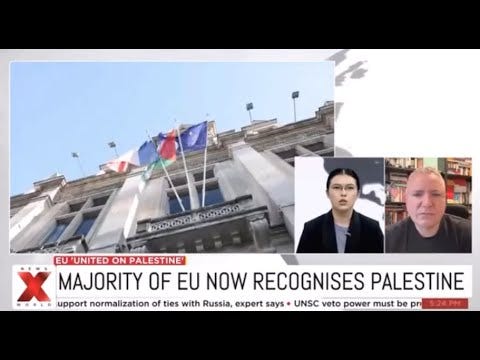By Dan Perry and Claire Berlinski
This week we sat down with Indian thought leader Vivek Y. Kelkar for a frank conversation about the India–U.S. rift and what it portends for the global economy. What emerged was both sobering and oddly hopeful — a reminder that the world is entering an unpredictable but potentially transformative phase.
A Bewildered India
Vivek began by describing the bewilderment in India at the sudden chill in relations with Washington. Just months ago, Modi was among the first foreign leaders welcomed by Trump; today, New Delhi is facing punishing tariffs of 25% on oil and 50% on key exports. For Indians, this feels like whiplash.
The domestic optics are toxic: Trump publicly takes credit for ceasefires in India–Pakistan skirmishes, undermining Modi at home and allowing the opposition to frame him as weak. In a noisy democracy with a coalition government, that kind of humiliation is politically explosive.
Tariffs and Trade Wars
Vivek was clear-eyed about the consequences of the new tariffs. A 25% oil tariff might be survivable, but 50% across other sectors—pharmaceuticals in particular—will bite hard. Substitute markets exist, but they don’t appear overnight. Trade shifts take time, and in the meantime, the global economy is already weakening.
The larger issue is structural. For decades, the rules-based order of the WTO required reciprocal concessions: if you lowered tariffs for one partner, you lowered them for all. That system is collapsing. Vietnam now cuts deals with the U.S. without extending the same benefits elsewhere, and no one blinks. The very idea of universal rules is fading, replaced by transactional, bilateral horse-trading.
China Rising
And into that vacuum steps China. Whether one likes it or not, Beijing has the manufacturing power and the diplomatic ambition to shape the next global order. Unlike Western economies that naturally shed low-cost production as they advanced, China is doubling down, deploying automation and AI to keep even the lowest-margin industries at home.
China is also exporting aggressively—not just to the U.S. but to Africa, ASEAN, Australia, and even India. With global growth stagnant, Chinese overcapacity is distorting markets everywhere, from Indonesian factories shuttering under pressure from cheap imports to Europe’s industrial core faltering under deflationary competition.
The U.S. Trap
Trump’s approach—transactional tariffs, disdain for alliances, and open hostility to the multilateral order—compounds the problem. His rhetoric that free trade has been a “rip-off” for America ignores that globalization lifted billions out of poverty while still enriching the U.S. as the world’s ultimate consumer market. Tariffs, Vivek warned, will impose direct costs on American households through higher prices. The public may not grasp this immediately, but inflationary pressure is unavoidable.
Russia in the Balance
A fascinating wrinkle: Trump himself has hinted that if peace comes to Ukraine, free trade could resume with Russia. As Vivek noted, there is logic to this: Russia’s resources—from nickel to gas—could help balance markets, while peeling Moscow away from Beijing might alter the world’s power geometry. But it would also amount to forgiving an act of aggression that has shaken the foundations of international law.
Toward a Rebalancing
This is where we coalesced around an admittedly optimistic thought: perhaps, inadvertently, Trump’s wrecking ball could force the world toward a necessary rebalancing. The post-1945 order was built around the U.S. and its allies; it enriched many but left vast populations feeling excluded.
Maybe the future is a new kind of G10 or G11—one that brings China, India, Brazil, and the EU (collectively the size of China’s economy) into the core decision-making table alongside North America. A structure that acknowledges today’s balance of power rather than pretending we still live in 1945.
Vivek agreed that such an arrangement could only work with the EU fully inside, not as individual states but as a bloc. And perhaps ASEAN too. China may see Europe as weak on hard power, but its economic clout is indispensable.
The Bottom Line
We may be watching the death of the rules-based order that underpinned decades of prosperity. But in its place could emerge something more representative, if messier: a world where power is shared among multiple poles, and where emerging giants sit at the table rather than outside the room.
That rebalancing will not be easy—and it may yet be derailed by protectionism, nationalism, or war. But as Vivek reminded us, history is full of unintended consequences. Perhaps even Trump, in his own chaotic way, will have contributed to a global correction.
AQL readers: Claire’s The Cosmopolitan Globalist is well worth checking out. Do so here.




